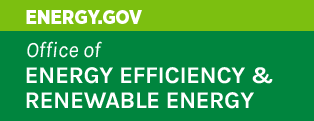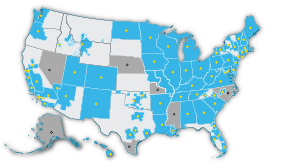A National Network of Local Coalitions
Clean Cities and Communities coalitions enhance the nation’s energy security, support economic prosperity, and improve air quality by fostering locally driven transportation energy choices that leverage domestic energy resources and innovative mobility technologies through collaborative partnerships with public and private stakeholders.
At the national level, the U.S. Department of Energy's Vehicle Technologies Office and DOE national laboratories provide unbiased and objective technical assistance, information resources, online training, and an array of data and analysis tools. At the local level, coalition staff leverage these resources to provide expertise, resources, and tools to strategically advance transportation in the regions they serve.
National Network
Clean Cities and Communities collaborates with federal agencies, national laboratories, fuel providers, industry associations, equipment manufacturers, and large companies whose vehicle fleets operate in multiple states.
Local Coalitions
Coalitions designated by the U.S. Department of Energy serve as the foundation of Clean Cities and Communities by implementing transportation projects in communities across the country. Coalitions are composed of vehicle fleets, fuel providers, community organizations, state and local government agencies, and businesses.
These stakeholders share information and resources, inform public policy, educate the public, and collaborate on transportation projects. Connect with your local coalition contacts to learn more.
Making an Impact
About 310 million people (90% of the total U.S. population) live inside the boundaries of Clean Cities and Communities coalitions, which make an impact in their communities every day. Nationwide, nearly 16,000 stakeholders are part of Clean Cities and Communities coalitions, and through their collective efforts they are transforming local and regional transportation markets.
Become a Coalition Stakeholder
Coalition stakeholders have access to an array of resources, including:
- Networking opportunities with fleets and industry partners who have experience in alternative fuels and advanced vehicle technologies
- Technical training, workshops, and webinars
- Information resources on electric and alternative fuels, advanced vehicles, idle reduction, energy efficient mobility systems, and other strategies and technologies to improve efficiency
- Data-driven interactive tools, calculators, and mapping applications to determine an appropriate solution
- Individual consultation and technical assistance
- Funding opportunities from the U.S. Department of Energy
- Information about funding sources from state and local government agencies, nonprofits, and foundations
- Assistance with funding applications
- Public recognition for progress in implementing alternative fuels and energy-efficient vehicle and mobility technologies
- Assistance with media outreach.
To become a stakeholder, contact your local coalition.


